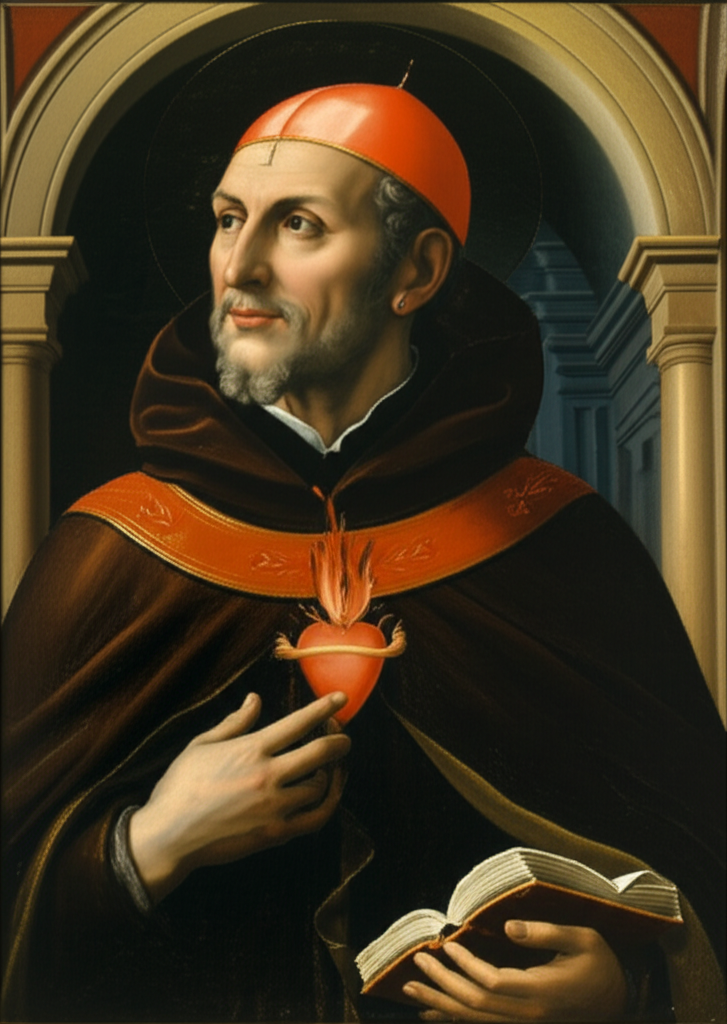
Early Life
Saint Augustine was born on November 13, 354, in Tagaste, now Souk Ahras, Algeria. He was born to a pagan father named Patricius and a Christian mother named Monica (who later became Saint Monica). Despite his mother's deep religiosity, Augustine was not baptized as a child and lived a life far from the Christian faith during his youth.
Augustine received a good classical education and became a renowned teacher of rhetoric. He moved to Carthage, Rome, and eventually Milan to pursue his academic career. During this period, he followed Manichaeism, a dualistic religious sect, and was also attracted to Neo-Platonism.
Conversion
Augustine's conversion happened gradually. In Milan, he met Bishop Ambrose, whose sermons greatly influenced him. In 386, while in a garden in Milan, Augustine heard children singing "Tolle lege" (Take and read). He picked up the Scriptures and opened to Romans 13:13-14, which speaks of abandoning a sinful life and putting on Christ. This moment became the turning point in his life.
Augustine was baptized by Bishop Ambrose at Easter in 387. After his mother's death, he returned to Africa and established a monastic community in Tagaste. In 391, he was ordained a priest in Hippo Regius (now Annaba, Algeria), and in 395 he became the Bishop of Hippo, a position he held until his death in 430.
Works and Legacy
Saint Augustine is one of the most influential Christian thinkers of all time. He wrote numerous theological and philosophical works that continue to influence Christian thought to this day. His most famous works include:
- Confessiones (Confessions) - A spiritual autobiography that narrates his journey from sin to conversion.
- De Civitate Dei (The City of God) - A monumental work written after the fall of Rome, explaining the relationship between the City of God (the Church) and the earthly city.
- De Trinitate (On the Trinity) - A deep exploration of the doctrine of the Trinity.
- Regula (The Rule) - A guide for monastic life that became the foundation for the Augustinian Order.
The Augustinian Order
Although Saint Augustine did not formally establish a religious order during his lifetime, the monastic community he founded and the rule he wrote became the basis for the Augustinian Order (Order of Saint Augustine) that was formally established in the 13th century. This order follows the Rule of Saint Augustine and focuses on community life, prayer, study, and pastoral service.
The Augustinian Order has made significant contributions to the Church through missions, education, and pastoral service. Many famous saints and theologians have come from this order, including Saint Thomas of Villanova, Saint Rita of Cascia, and Gregor Mendel (the father of modern genetics).
Teachings and Spirituality
Saint Augustine's teachings cover a wide range of theological and philosophical topics, including:
- Grace and Free Will - Augustine emphasized that salvation is a gift of God's grace, but humans have free will to accept or reject it.
- Original Sin - He developed an understanding of original sin as the corruption of human nature inherited from Adam.
- The Church - Augustine saw the Church as a community of people called by God and united in love.
- Love - For him, love was the center of Christian life. He is famous for his saying, "Love, and do what you will."
Augustinian spirituality is characterized by the search for God through self-introspection, living in community, and service to others. Augustine believed that the human heart is restless until it finds rest in God, as he wrote in his Confessions: "You have made us for yourself, O Lord, and our heart is restless until it rests in you."
Influence and Relevance
Saint Augustine is recognized as one of the Doctors of the Church and one of the most influential Christian thinkers. His teachings have influenced Catholic, Orthodox, and Protestant theology. Martin Luther, John Calvin, and many Protestant reformers were heavily influenced by his writings.
Even in the modern era, Augustine's thought remains relevant. His reflections on time, memory, and self-awareness have influenced modern philosophy. His approach to faith and reason has inspired generations of theologians and philosophers. And his honest search for truth continues to speak to those seeking meaning and purpose in life.
Celebration and Veneration
The feast of Saint Augustine is celebrated on August 28, the day of his death. He is depicted in art with various symbols, including a flaming heart (symbolizing his love for God), a book (symbolizing his works), and a child by the seashore (referring to the legend where he met a child trying to empty the sea into a small hole, teaching him about the limitations of human understanding of God's mysteries).
Saint Augustine is the patron saint of theologians, printers, brewers, and those struggling with temptation. He is also honored as the patron of several cities, including St. Augustine, Florida, which is named after him.
Prayer to Saint Augustine
"O great Saint Augustine, who has received from God the gift of a brilliant intellect and a heart full of love, help us in our search for truth and wisdom. As you found peace after years of searching, may we also find rest in God, the source of all goodness. Teach us to love what you loved and to do what you taught. Through your example, may we learn that it is never too late to turn to God and that His grace is always available to those who seek it. Amen."
Artikel atau doa ini dapat disalin dan disebarluaskan dengan syarat mencantumkan sumber artikel dari www.doa-katolik.com
Artikel atau doa ini dapat disalin dan disebarluaskan dengan syarat mencantumkan sumber artikel dari www.doa-katolik.com